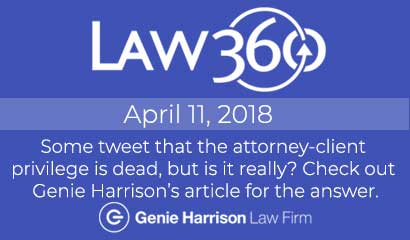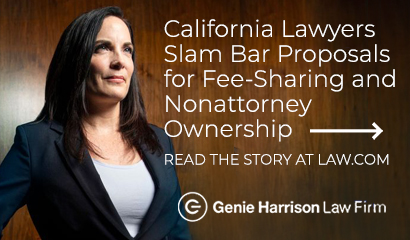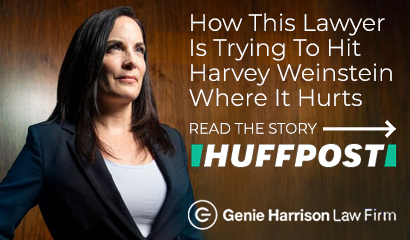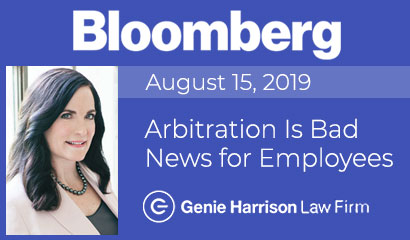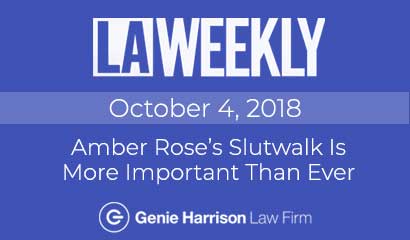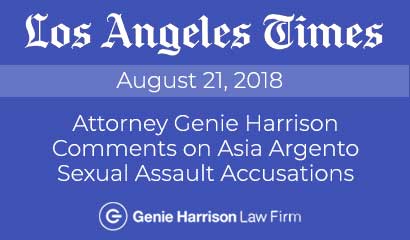Attorney-Client Privilege Is Alive And Well
April 11, 2018 — By Employment Attorney Genie Harrison for Law 360
The FBI raid of the Rockefeller Center office and Manhattan hotel room of President Donald Trump’s personal lawyer Michael D. Cohen set off a firestorm of controversy about the sanctity of the attorney-client privilege, epitomized by Trump’s tweet that the “privilege is dead.”
In fact, the privilege is alive and well. What is not so healthy is minimizing the importance of the crime-fraud exception, the basis for Monday morning’s raid. The crime-fraud exception to the attorney-client privilege extends to communications between an attorney and his client that are predicated on committing or covering up a crime. The exception offers no haven for attorneys engaged in criminal acts.
This case is not about the women with whom Trump may have had sex; it is about criminal acts that are not and should not be protected by the attorney-client privilege.
As a plaintiffs attorney in employment and civil rights cases, I have battle scars from the times I have sought crime-fraud exceptions to the attorney-client privilege. Even with what I believed to be strong facts, convincing a federal magistrate to allow what many argue is an intrusion into the privilege proved impossible.
Attorney-client privilege is never taken lightly. That a warrant issued, and that a search was conducted in the case of Trump’s personal attorney is proof of the seriousness of the matter and the merits of the government’s warrant application.
The crime-fraud exception allows law enforcement officials to obtain otherwise privileged communications only if they can convince a judge that there is reason to believe that the communications they seek are likely to establish that the subject attorney was involved in committing or planning to commit fraud. The officials must also demonstrate that all necessary precautions will be taken to protect privileged communications.
Monday’s raid, conducted at the direction of the U.S. Attorney’s Office for the Southern District of New York, had to have been conducted strictly by the book. Anything less would have guaranteed failure.
To obtain its warrant to seize business records, emails and documents related to topics including a payment to a pornographic film actress, the U.S. Attorney’s Office was required to follow a set of stringent conditions, laid out in detail at Section 9-13.420 of the U.S. Attorneys’ Manual, “Searches of Premises of Subject Attorneys.” The conditions make clear the extraordinary nature of such a search:
There are occasions when effective law enforcement may require the issuance of a search warrant for the premises of an attorney who is a subject of an investigation, and who also is or may be engaged in the practice of law on behalf of clients. Because of the potential effects of this type of search on legitimate attorney-client relationships and because of the possibility that, during such a search, the government may encounter material protected by a legitimate claim of privilege, it is important that close control be exercised over this type of search.
The manual proceeds to spell out the guidelines that must be followed each time a warrant to search an attorney’s office is sought. The guidelines are intended to safeguard against violations of attorney-client privilege by law enforcement and to restrict access only to the evidence that falls within the crime-fraud exception. They underscore how extraordinary the Cohen office raid was and the lengths to which investigators had to go to conduct it.
Before seeking a warrant, investigators must first have tried to obtain the evidence some other way, such as by subpoena. Additionally, authorization for the search must have been issued by the U.S. attorney or by an assistant attorney general. In the Michael Cohen case, authorization came from U.S. Deputy Attorney General Rod Rosenstein, who occupies an even higher position.
The guidelines further state that the prosecutor must confer with the U.S. Department of Justice’s Criminal Division. “In addition to obtaining approval from the United States Attorney or the pertinent Assistant Attorney General, and before seeking judicial authorization for the search warrant, the federal prosecutor must consult with the Criminal Division.” The consultation is not a quick phone conversation; it is a lengthy and convoluted process:
To facilitate the consultation, the prosecutor should submit the attached form (see Criminal Resource Manual at 265) containing relevant information about the proposed search along with a draft copy of the proposed search warrant, affidavit in support thereof, and any special instructions to the searching agents regarding search procedures and procedures to be followed to ensure that the prosecution team is not ‘tainted’ by any privileged material inadvertently seized during the search.
Once the warrant has issued, the team conducting the search must “employ adequate precautions” to ensure that the searchers will not improperly view privileged attorney-client communications. The warrant is obligated to designate a “privilege team” consisting of lawyers and agents not working the case, a team tasked with ensuring that the investigators conducting the search do not see privileged communications. Finally, the investigators are required to develop a detailed and thorough review process for every piece of seized material.
These guidelines are draconian, to say the least. Let us assume that, in the Michael Cohen case, the U.S. Attorney’s Office followed the guidelines to the letter, dotting every “i” and crossing every “t.” Even then, there was no guarantee a magistrate judge for the U.S. district court would grant the warrant. That’s how sacrosanct attorney-client privilege is in this country.
The Michael Cohen story, despite the tweet storm and other distracting commentary, is in the end not about the claimed violation of Trump’s purported attorney-client privilege. Instead, it is about something much graver and more threatening to the values of the American legal system — one attorney’s alleged complicity in potential criminal activity.
It should scarcely need to be said that as attorneys, we are not here to facilitate our clients’ violations of the law. Rather, we are privileged to provide a vigorous, ethical defense if we represent the defendant, and, if on the other side, to help achieve justice for those who have been victimized by the illegal actions of others. But never, ever, should we debase our noble profession by using the attorney-client privilege to facilitate illegal acts.
And law enforcement’s well-supported warrant, and proper execution of that warrant, on an attorney whose acts may fall in the crime-fraud exception, does not undermine the rule of law — it bolsters it.
Genie Harrison, lead trial attorney at the Genie Harrison Law Firm in Los Angeles, represents plaintiffs in civil rights and employment cases.
The opinions expressed are those of the author(s) and do not necessarily reflect the views of the firm, its clients, or Portfolio Media Inc., or any of its or their respective affiliates. This article is for general information purposes and is not intended to be and should not be taken as legal advice.


